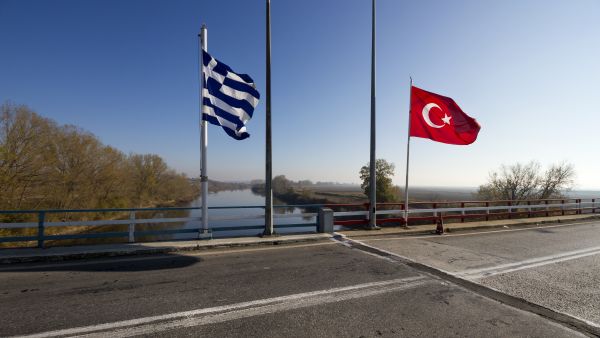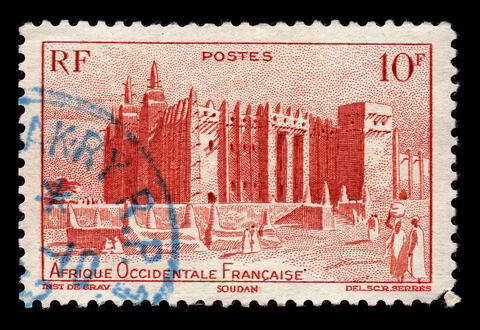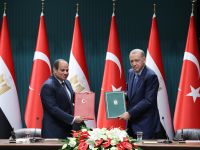By Farzad Ramezani Bonesh
Greece and Turkey have had a history of war and strife in recent centuries. Their relationships have always been tense over the past few decades. In general, there have been differences on many historical, cultural, geopolitical, maritime, political, security, and military issues.
Cultural and historical differences
Disputes over historical heritage are one aspect of the problem between the two countries. The Muslim and Turkish populations living in Greece and the Greek population living in Turkey have already been in the process of population exchange. But there are still differences and different attitudes of the two countries in this area.
Turkey emphasizes the right to education in the mother language, teachers who have educated in Turkey and want to return to Greece, and about 150,000 Turks and Muslims in Greece. Greece has long objected to Turkey's approach to historical and Greek heritage such as Hagia Sophia. After changing the usage of Hagia Sophia, despite Greece's attempt to show Hagia Sophia as Christian, Turkey claimed its right of sovereignty.
Arms race and military reinforcement of the two sides
Maritime borders and differences in strategic and important areas are reasons and motivations behind tensions and arms rivalries and military reinforcement. Strengthening the military and modernizing the forces and increasing the army's capacity for deterrence will increase tensions.
On the one hand, Greece has made extensive efforts in this direction. US-Greek bilateral relations have been strengthened by intense diplomatic efforts and lobbying by the diaspora community. The United States seems to be considering Greece as a replacement for Turkey.
Although tensions between Turkey and Greece do not serve US interests, a defense cooperation agreement, US access to four bases in Greece, and the lifting of an arms embargo against the Republic of Cyprus have added new dimensions to Athens's relations with Washington.
Meanwhile, the sale of four warships to Greece, the modernization of others and the offer to sell 20 F-35 fighter jets to Greece in the upcoming Athens-Washington talks are a major step towards military deterrence and absolute air superiority over Turkey.
In addition, with the signing of the defense agreement between France and Greece in September 2021, France has practically pledged to provide immediate military assistance to Greece in the event of an attack by a third country. In addition, the acquisition of new frigates, new equipment and French fighters strengthens Greece's deterrent capabilities.
On the other hand, although Turkey has taken many steps in recent years to further equip, purchase weapons, strengthen its military and naval forces, the reality is that time is not in Turkey's interest after the US sanctions against Turkey about the case of the F-35.
Turkey is pursuing consultative meetings and easing tensions between with Greece within the framework of NATO and confidence-building measures by looking at the arms race with their neighbors. Critics of senior Greek politicians have also criticized Greece's military spending and activities as a violation of previous agreements.
In fact, in the year 2020, Turkish and Greek warships were on standby. Despite the withdrawal of both, now developments such as the ratification of the defense agreement with France in the Greek parliament, and the military maneuvers in the islands very close to Turkey could move Ankara towards a further confrontation with Greece.
In other words, the two sides now tend to make changes in military spending, increase the number of airspace violations in the Aegean, and to decrease the use of force.
Cyprus, Aegean Islands and Maritime Influence
Many of the contemporary problems between Turkey and Greece stem from the situation in Cyprus in 1974. The Turkish Republic of Northern Cyprus is recognized only by Turkey. But Turkey's policy towards Cyprus, based on a two-state solution, and Ankara's decision to reopen the Varosha coastline has been widely criticized by the international community and the Security Council. In addition, Turkey is angry at the effect of the alliance of the Republic of Cyprus and Greece on the European Union over the EU's approach to Turkey.
In fact, the differences between the two countries over the islands in the Aegean Sea, the militarization of the islands, the violation of airspace, the continental shelf and the monopoly-economic zone, etc., increase the scope of tension. The two sides have conflicting views on previous treaties such as the Treaty of Lausanne, the Aegean Islands, the violation of privacy, and so on.
In addition to Greek efforts to find energy in recent years, Turkey has pursued plans to find energy in the disputed waters with Greece and the Republic of Cyprus. Turkey has become bolder in claiming sovereignty over the eastern Mediterranean. With the longest continental coastline in the eastern Mediterranean, it fears the expansion of Athenian territory into the Aegean and Mediterranean.
This reduces shipping routes and spheres of influence, the monopoly zone and the interests of Turkey. Even in the worst case scenario, Turkey's access to the Mediterranean will be limited to the Gulf of Antalya.
From Turkey's point of view, the issues of Greece's approach to the Aegean directly affect Turkey's fundamental rights and interests in issues such as territorial waters, delimitation of the continental shelf, delimitation of maritime borders, legal status of the Aegean Sea, national airspace and violation of civilian status of islands.
From this perspective, the unilateral expansion of territorial waters from 6 nautical miles in the Aegean Sea to 12 nautical miles, reduces the ratio of open waters from about 50 percent to 19 percent and significantly limits Turkey's access to the Aegean Sea. In Ankara's view, the arming of the Aegean islands and Greece's maximum claims to the Mediterranean seriously threatens Turkey's national security.
Turkey claims that Greece is ignoring international agreements and fueling tensions. Therefore, Turkey is strongly pushing for the demilitarization of some Aegean islands by Greece. On July 13, Turkey’s permanent representative to the United Nations complained about Greece's position. But many in Greece see the militarization of the islands as a necessary approach against the Turkish threat.
Conflicting alliances and coalitions in the region
Turkey has strengthened its presence and operational influence in the eastern Mediterranean with the Mavi Vatan Doctrine, its growing maritime industry, and its agreement with Libya. In practice, however, Athens has established a number of alliances, networks, and arrangements for energy and security cooperation with Turkey.
The Eastern Mediterranean Gas Forum (EMGF) refused to accept Turkey and the consolidation of the alliance between Cyprus, Egypt, Greece and Israel and the extensive political, economic and military cooperation between them is seen to the detriment of Turkey.
The three countries, Cyprus, Armenia and Greece, have also increased cooperation in practice, and Cyprus and Greece have played an important role in preventing the reduction of Turkey-EU tensions, pressure on Turkey and Turkey's international isolation. Israel is practically on the Athens' side.
In another European perspective, Greek sovereignty over the disputed islands with Turkey is unquestionable. Therefore, Turkey must respect it. Some other actors see this as just an opportunity to advance their anti-Turkish policies.
The issue of refugees and anti-Turkish groups
Turkey hosts more than a few million refugees and has repeatedly threatened to open its border gates to Europe. Athens, meanwhile, seems to believe that Erdogan's threat, by using refugee weapons, is seen as putting pressure on Europe and Greece to escalate tensions between the two countries.
On the other hand, many in Turkey believe that the PKK was active in Greece or accused Greece of continuing to support the PKK. In addition, Ankara evaluates the refusal to extradite troops and the presence of some military commanders in the failed 2016 coup and Gulen's students in Greece as negative.
Vision
Turkey and Greece have already agreed to keep bilateral communication channels open. In fact, regular political consultations between the foreign ministries, visits and contacts between the officials of the two countries, and even trade relations, tourism, etc., have created hopes for reducing tensions in relations.
But the process of consultations and talks does not have the necessary stability and effectiveness and can be questioned. Also, the parties cannot agree on the framework and type of strategy to reduce their main tensions. In fact, periodic developments and events can heighten tensions between Ankara and Athens.
In addition, the growing support of foreign actors from Greece against Turkey, the security of the refugee issue, and the propaganda of extremist nationalists against each other could add to the scope of the dispute.
In the meantime, it is unlikely that the two countries will declare war on each other, but the current trend will be the continuation of the tense atmosphere between the two countries in the field of diplomacy, security-military and international alliances.









